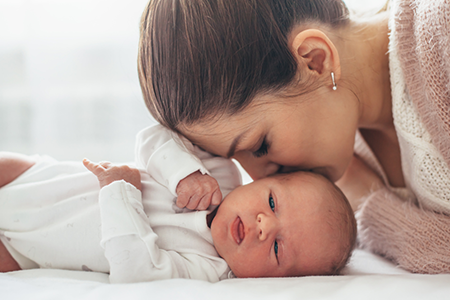
Common postpartum symptoms: what's normal and what's not
After you've welcomed your newest addition, much of your attention is focused on meeting your baby's needs. This special time of bonding is important for both of you. However, it's important to take care of your own recovery too.
This postpartum period - sometimes called the fourth trimester - can include a variety of symptoms as your body recovers. Many are normal parts of healing after a baby. But some could signal a need to visit with your OB GYN. Learn more about what to expect and when you should talk to your doctor.
7 common symptoms after having a baby
- Bleeding and perineum pain: Whether you had a C-section or a vaginal birth, you can expect vaginal bleeding the days and weeks after birth. A few clots are normal too. But the American Academy of Family Physicians says to call your doctor if you have clots larger than a quarter. You'll also have soreness and pain in your perineum - the area between your vagina and anus. The severity and amount of time you experience perineal pain can depend on the type of delivery you had.
- Breast tenderness: If you're breastfeeding, you may have some discomfort as you adjust during the first few days. Many moms temporarily have breast tenderness or engorgement when their milk first comes in. But, in general, breastfeeding shouldn't cause pain. In addition to a latch problem, La Leche League says pain could be a sign of yeast infection or mastitis. These require treatment from your OB GYN.
- Constipation and hemorrhoids: Constipation and hemorrhoids are both fairly common in the days following delivery. For some new moms, the pain medications or anesthesia used during their delivery can increase constipation. Pressure caused during pregnancy or childbirth commonly contributes to hemorrhoids, which are swollen veins in the rectum. Both of these typically resolve in the weeks after birth.
- Changes in emotions: The many hormones involved in pregnancy and the postpartum period can lead to a range of emotions. Feeling a mixture of emotions, including sadness on occasion, is normal. However, if you feel sad or overwhelmed the majority of the time, talk to your OB GYN. The Office on Women's Health says "baby blues" that last more than a couple of weeks could be a sign of postpartum depression.
- Abdominal pain or cramps: As your uterus goes back down to its normal size, you may experience afterpains. These abdominal cramps typically happen in the first few days after delivery. Some moms notice afterpains are more intense when breastfeeding. If you had a C-section, soreness or pain around the incision is normal too. This pain should decrease as you recover, and your OB GYN can prescribe medications to help you better manage it.
- Hair loss: During pregnancy, you may have noticed a thicker head of hair. After your baby is born, you may notice more hair loss than usual. The American Academy of Dermatology says this excessive shedding after childbirth is due to your estrogen levels. It can last for several months, but your hair will eventually return back to your pre-pregnancy fullness.
- Swelling and water retention: The swelling seen during pregnancy can last into the postpartum period too. If you notice you still have swelling in your feet, hands, or legs during the first week after delivery, it typically isn't a concern. However, swelling in your face and hands is a symptom of postpartum preeclampsia. If you have persistent swelling along with other symptoms like high blood pressure, vision changes, headache, or stomach issues, the Preeclampsia Foundation says to call your OB GYN right away.
When to call your OB GYN
While many of these seven symptoms are normal and eventually go away on their own, any symptom that continues or gets worse warrants a call to your OB GYN. It's also important to know the warning signs of an infection or other potentially serious postpartum condition.
The March of Dines says to call your doctor if you have:
- High fever
- Severe abdominal pain or severe pain around your incision or stitches
- Pain or burning when urinating
- Bad-smelling discharge
- Pain, redness, or swelling in your calves
- Vaginal bleeding that continues to get worse as time passes
- Chest pain
- Sudden changes in vision, dizziness, and severe headache
- Ongoing or overwhelming sadness or anxiety
Overall, the most important thing you can do as you recover is to listen to your body. If something doesn't feel right or you have a concern, call your OB GYN's office. He or she is there to keep you healthy during your postpartum recovery and is your best resource to know what's normal and what needs extra attention.
